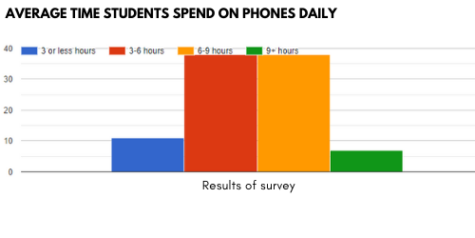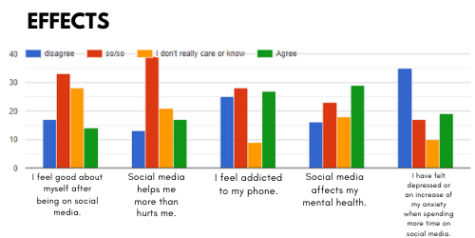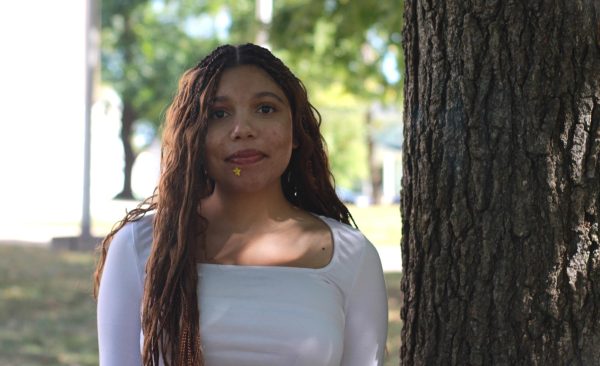The Cost of Social Media
SCHS students speaking about the effects of Social Media in their lives
Within the last decade, technology has excelled in being a part of people’s lives. Computers, cell phones and social media have begun to be the beginning, middle and end of a majority of people’s day-to-day schedule. Social media has been found to be beneficial for information and research, as well as reaching out to others or communicating with relatives and friends. Social media has also been raising the question of if it is hurting people involved more than helping. A lot of people feel in between, or very black and white. Experts in July 2021 conducted several tests to guide the effect of social media on a human. There are 4.48 billion people in the world who are users of social media, estimating about 57 percent of our population. Sixteen and one-half new users are on social media every second, increasing the use of social media by 13.1 percent. On average, people spend 15 percent of their lives awake on technology. Tammy Orrick, Psychology teacher at St. Charles high, discussed some very important input given about social media via email.
“It is important to remember that research/studies can show different trends/numbers depending on what you want the numbers to say. Teenagers’ prefrontal cortex (aka brain) are still maturing and will not be fully mature until 25 years (average). This is important to understand why social media is so influential in our lives. As the individual matures their ability to abstract think and process information becomes more rational, and less impulsive. Social media provides opportunities for individuals to be confrontational without assuming risk. Further impairing their ability to work on their in person communication skills and encouraging negative habits/self- talk,” Orrick said.
Orrick spoke about how social media affects teenagers and adults and the impact it has on everyone’s development and existence. She also spoke up about health issues connected to social media platforms and technology.
“Social media can cause mental & physiological health concerns fixating on unrealistic expectations, toxic information, poor use of time (staying up late/not getting enough sleep (ave. teenagers should get 8-9 hours of sleep a night) or lack of focus on priority items),” Orrick said.
She believes that impulse control is a big reason why students struggle with staying off of their phones.
“Adolescent brain is not yet done growing/maturing. The part of the brain that is still developing involves impulse control, which makes it hard for individuals to self regulate,” Orrick said.
Although there is a negative side to electronics, she believes that if it can be regulated and used in a healthy manner, then it can be more helpful than harmful.
“I think that it is a slippery slope, students need to work on moderation. Technology is necessary for society today; however, students need to learn how to be productive with the screen time, and limit the negative outside influences while monitoring time usage,” Orrick said.
This may be harder for some than they think; many students spend much more time on technology than is considered a beneficial amount.
“According to the American Pediatric Association, adolescents should spend less than two hours a day on screen time (this includes Phones, Ipads, Computers, TV, etc.),” Orrick said.

Students at SCHS have also used their voices to express their opinions on the issues of social media, and the effects on a person. Keifer Utley, a freshman, says that he doesn’t believe all the drama included is always worth it.
“There’s a lot of ups and downs, and a lot of drama with certain things. You can meet a lot of positive people and other times you can meet those people, and a lot of negativity comes out of it,” Utley said.
Utley admitted that staying off his phone has become a struggle in his days.
“I find myself on it within the next minute, even though I just told myself I need to put it down,” Utley said.
Morgan Wright, senior, doesn’t see social media as important as others do. Wright feels like it is irrelevant to her life and sees it as nothing beneficial.
“I feel like my whole outlook on it is that it’s not important. I feel like a lot of people need the likes and the following,” Wright said, “It can definitely control your looks, how you’re feeling, beliefs and other stuff.”

Holden McKean, freshman, stated that he feels like it’s not a necessity and has never used social media.
“I never really needed it,” McKean said.
Although McKean doesn’t have social media, he does see the bad outcomes from an outsider’s perspective.
“It can be used for good things, but a lot of times it has a negative impact on people. It gives people a sense of animosity, and they think they can do whatever they want and not have any consequences or sometimes it can affect people’s self esteem; other times, it’s great for people that like to share with friends and talk with them,” McKean said.
Krystal Roeper-Mokriakow, a sophomore, also doesn’t use social media, but for different reasons.
“Whenever I’m on it I just feel more insecure about myself because I look at people and I’m like these people have this and I don’t and I just try to stay away from that,” Roeper-Mokriakow said, “I’ve had Instagram before, and when I was on it I was just looking at it all day. I felt it was just taking me away from my family and from other stuff I need to get done, so I had to uninstall it. It was taking too much time away from me.”
Ryan Restivo, a senior, believes social media to be a bad habit to get into if not moderated. For Restivo, it has a positive effect on him fortunately.
“Social Media as a concept is about connecting with people, but I feel like if you connect with the wrong kind of people it can make you feel bad. I mainly connect with friends and family who I’m already close to, so it’s a good thing for me,” Restivo said.
Restivo believes the difference in why it is beneficial to him and not for many, is because of how he uses social media compared to others.
Alyssa Scofield, freshman, just finds it stressful to be a part of all the time.
“Lately there has been a lot of toxicity online, and it’s very stressful seeing negativity everyday,” Scofield said.
Meg Ellison, junior, believes that she, as well as others, have been victims of increased self image and body issues from social media, leading to body disorders and unhealthy habits. She doesn’t think the accessibility of the internet for young children is smart for their generation.
“Social media is a good and bad place and mostly for younger females. Not to discredit the males, but we, especially me, I was growing up being told what to eat and what to wear. Not by my parents, but by the school that I was at, by the books that I was reading, the magazines that I would look at, just media. After a while I realized, this is not healthy. Even today young kids are having more access to the internet, to phones, and on Tik Tok you have those people who are skinny and beautiful and ‘buy this product or this one’. It’s just unhealthy for the kids. I’m worried about the kids. I know what it’s like to grow up in this world and it’s very harsh,” Ellison said.





